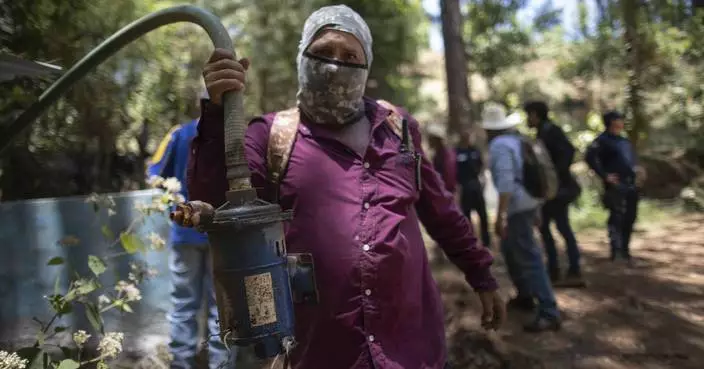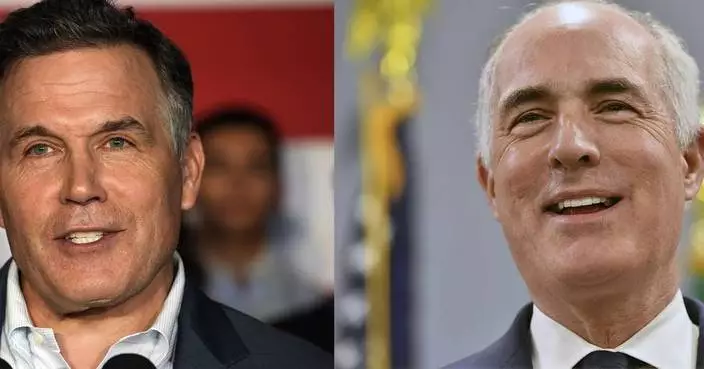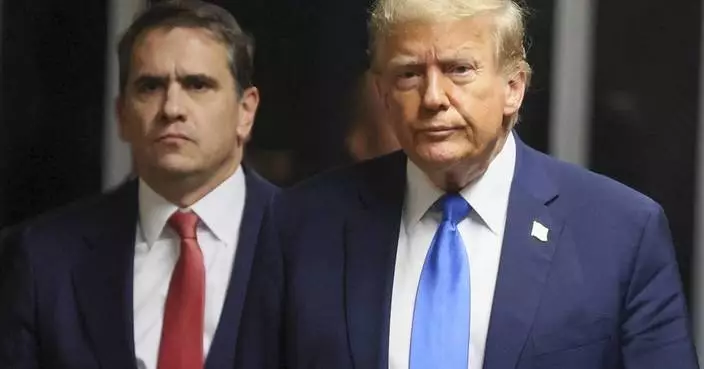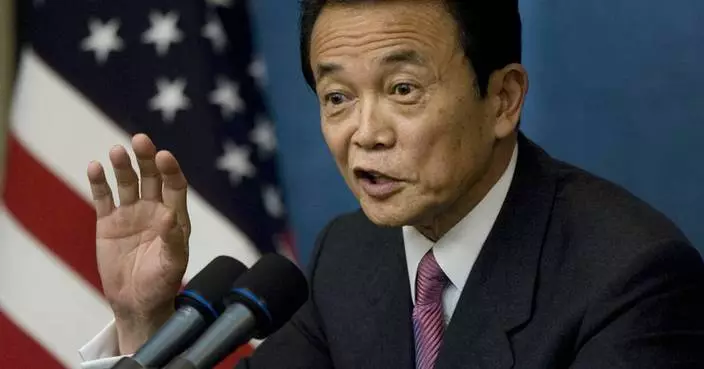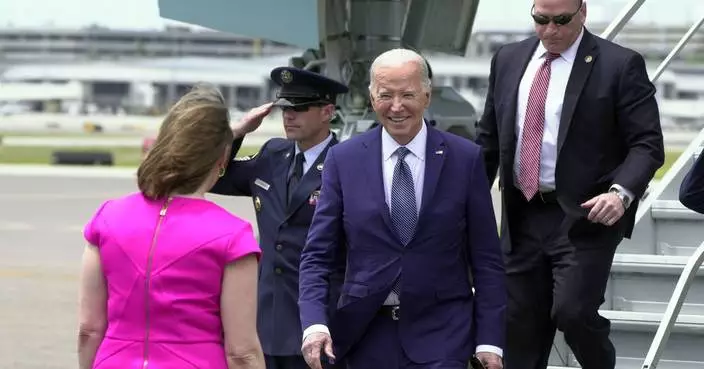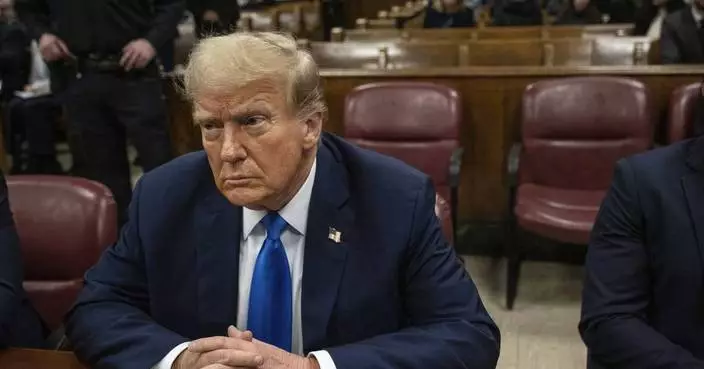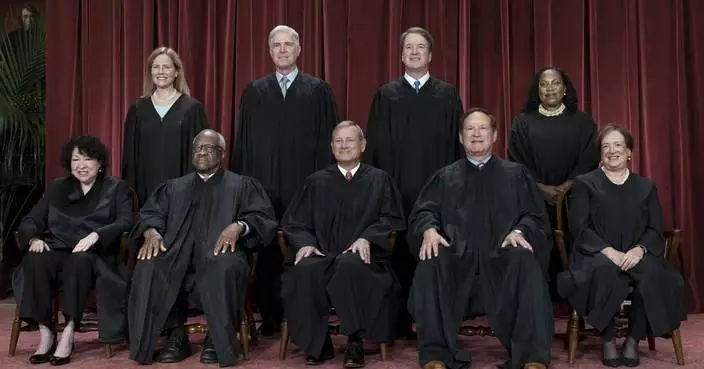Reveling in his pardon powers, President Donald Trump said Friday he's thinking "very seriously" about pardoning former heavyweight champion Muhammad Ali, whose conviction was already overturned by the Supreme Court in 1971.
It's one of "thousands" of cases the president's team is reviewing, he told reporters as he left the White House en route to a world leaders' summit in Canada. And Trump said he's thinking about soliciting recommendations about other cases to consider from pro football players and other athletes who have protested racial injustice by kneeling during the national anthem — a tactic Trump has fiercely denounced.
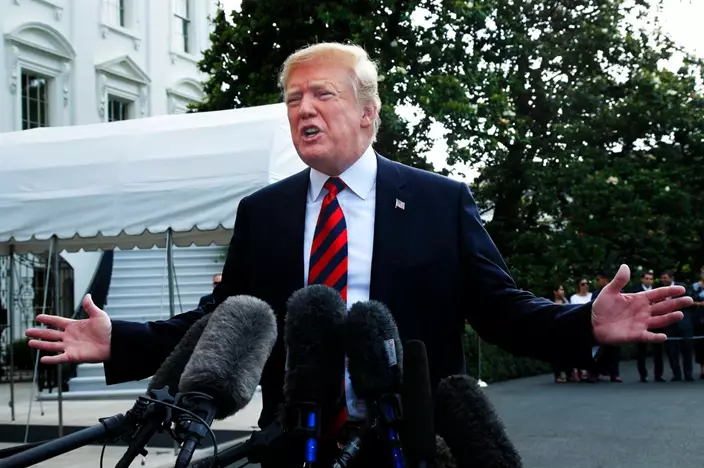
President Donald Trump speaks to reporters before leaving the White House in Washington, Friday, June 8, 2018, to attend the G7 Summit in Charlevoix, Quebec, Canada. (AP Photo/Manuel Balce Ceneta)
Trump said that, "instead of talk," he's "going to ask all of those people to recommend to me — because that's what they're protesting — people that they think were unfairly treated by the justice system."
"I'm going to ask them to recommend to me people that were unfairly treated, friends of theirs or people that they know about and I'm going to take a look at those applications," he said.
Trump has been on a clemency kick of late, using his near-limitless power to pardon a growing list that includes a former White House aide, a conservative commentator and a former sheriff convicted of violating a judge's orders who campaigned with Trump in 2016.
Earlier this week, he commuted the life sentence of a woman whose cause was championed by reality television star Kim Kardashian West. Last month he granted a posthumous pardon to boxing's first black heavyweight champion, Jack Johnson. Actor Sylvester Stallone alerted him to that case.
Trump told reporters Friday his team is now "looking at literally thousands" of people who have come to their attention because they've been treated unfairly or their sentences are too long.
"We have 3,000 names. We're looking at them," Trump said, calling the power to pardon "a beautiful thing."
Among them is Ali, who died in 2016.
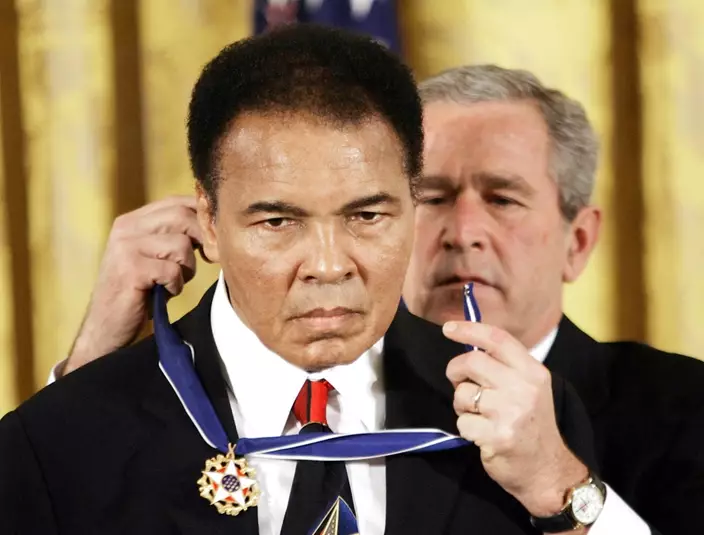
FILE - In this Nov. 2009 file photo, President Bush presents the Presidential Medal of Freedom to boxer Muhammad Ali in the East Room of the White House. President Donald Trump said he is thinking "very seriously" about pardoning Muhammad Ali, even though the Supreme Court vacated the boxing champion's conviction in 1971. (AP Photo/Evan Vucci)
Born Cassius Clay, Ali changed his name after converting to Islam in the 1960s. He refused to serve in the Vietnam War because of his religious beliefs, declaring himself a conscientious objector. He was stripped of his heavyweight crown in 1967, but his legal fight ended in 1971 when the Supreme Court ruled in his favor and overturned his conviction. He regained the boxing title in 1974.
"I'm thinking about somebody that you all know very well. And he went through a lot. And he wasn't very popular then," Trump said. "He certainly, his memory is very popular now."
Ron Tweel, Ali's lawyer, pointed out that Ali has no criminal record.
"We appreciate President Trump's sentiment, but a pardon is unnecessary," he said.
The White House did not immediately respond to questions about why the president feels one is needed.
Trump said last week also said he's considering commuting the sentence of former Illinois Gov. Rod Blagojevich, who is serving 14 years in prison for corruption, and pardoning celebrity lifestyle guru Martha Stewart, who served about five months on charges connected to an insider trading case. O.J. Simpson, he said in response to a reporter's question, is not on his list.
The president has been operating outside the usual Justice Department clemency protocol, in which submitted cases are carefully considered based on their merits, and recommendations made. Instead, White House officials say, Trump has focused on individual cases that have caught his attention or been brought to him by friends or celebrities. He's been especially drawn to cases in which he feels a person's prosecution has been politically motivated — a situation that may remind him of his own predicament at the center of the special counsel investigation into Russian election meddling.
Trump insisted Friday that he was also interested in clemency for regular people and those without high-profile backers.
He said that, "it's easier and people find it fascinating" to see him pardon the famous, but that he "would get more thrill out of pardoning people that nobody knows."
Yet Trump's suggestion that professional athletes help him identify cases only seemed to fuel concerns that those without star advocates will be ignored.
"Well, you know, if you think about it, that's really -- that becomes celebrity advocates. But they know a lot of things that we're not going to know. They've seen a lot of abuse and they've seen a lot of unfairness," he said.
The idea also sparked backlash from the American Civil Liberties Union.
"President Trump has spent much of his first 18 months in office degrading NFL players who protest police brutality and racial injustice. Today, he has tried once again to change the narrative about the work of those and other activists, betraying a fundamental misunderstanding of the cause behind these protests — and using racist dog whistles to do it," said Jeff Robinson, the group's deputy legal director.
The players have been protesting racial injustice and the high numbers of African Americans killed by police.
WASHINGTON (AP) — The Supreme Court hears arguments Thursday over whether Donald Trump is immune from prosecution in a case charging him with plotting to overturn the results of the 2020 presidential election.
It's a historic day for the court, with the justices having an opportunity to decide once and for all whether former presidents can be prosecuted for official acts they take while in the White House.
But between a decades-old court case about Richard Nixon, and an obscure constitutional provision about presidential impeachments, there are likely to be some unfamiliar concepts and terms thrown about.
Here are some tips to help follow everything:
The court marshal will bang the gavel at 10 a.m. EDT and Chief Justice John Roberts will announce the start of arguments in Donald J. Trump vs. United States of America, as the case is called.
The session easily could last two hours or more.
There are no cameras in the courtroom, but since the pandemic the court has livestreamed its argument sessions. Listen live on apnews.com/live/trump-supreme-court-arguments-updates or the court’s website at www.supremecourt.gov. C-SPAN also will carry the arguments at www.c-span.org.
Expect to hear talk about the impeachment process and the relationship, if any, to criminal prosecution.
Central to Trump's immunity argument is the claim that only a former president who was impeached and convicted by the Senate can be criminally prosecuted. Trump was impeached over his efforts to undo the election in the run-up to the violent riot at the U.S. Capitol on Jan. 6, 2021. But he was acquitted, not convicted, by the Senate in 2021.
Trump's lawyers cite as backup for their argument a provision of the Constitution known as the Impeachment Judgment Clause that says an officeholder convicted by the Senate shall nevertheless be “liable and subject to indictment, trial, judgment and punishment” in court.
Prosecutors say the Trump team is misreading the clause and that conviction in the Senate is not a prerequisite for a courtroom prosecution.
There's going to be plentiful discussion about Nixon but not necessarily for the reasons one might think.
Trump's team has repeatedly drawn attention to a 1982 case, Nixon v. Fitzgerald, in which the Supreme Court held that a former president cannot be sued in civil cases for their actions while in office. The case concerned the firing of an Air Force analyst, A. Ernest Fitzgerald, who testified before Congress about cost overruns in the production of a transport plane.
Fitzgerald's lawsuit against Nixon, president at the time of the 1970 termination, was unsuccessful, with Justice Lewis Powell writing for the court that presidents are entitled to absolute immunity from civil lawsuits for acts that fall within the “outer perimeter” of their official duties.
Importantly, that decision did not shield presidents from criminal liability, though Trump's team says the same analysis should apply.
Special counsel Jack Smith's team is also likely to bring up a separate Supreme Court decision involving Nixon that they say bolsters their case — a 1974 opinion that forced the president to turn over incriminating White House tapes for use in the prosecutions of his top aides.
Prosecutors have also noted that Nixon accepted rather than declined a subsequent pardon from President Gerald Ford — a recognition by the men, they say, “that a former President was subject to prosecution.”
The justices are known to love presenting hypothetical scenarios to lawyers as a way of testing the outer limits of their arguments. Expect that practice to be on full display Thursday as the court assesses whether former presidents are entitled to absolute immunity.
Already, Trump's lawyers have warned that if the prosecution is permitted to go forward, it would open the floodgates to criminal charges against other presidents, such as for authorizing a drone strike that kills a U.S. citizen or for giving false information to Congress that leads the country into war.
In a memorable moment during arguments in January before a federal appeals court, a judge asked a Trump lawyer whether a president who ordered a Navy SEAL to assassinate a political rival could be prosecuted.
Look for Smith's team to try to draw a sharp distinction between acts that it says are quintessential exercises of presidential power — such as ordering a drone strike during war — to the acts that Trump is accused of in this case, such as participating in a scheme to organize fake electors in battleground states. Those acts, prosecutors say, are personal acts and not presidential ones.
Associated Press writer Mark Sherman contributed to this report.
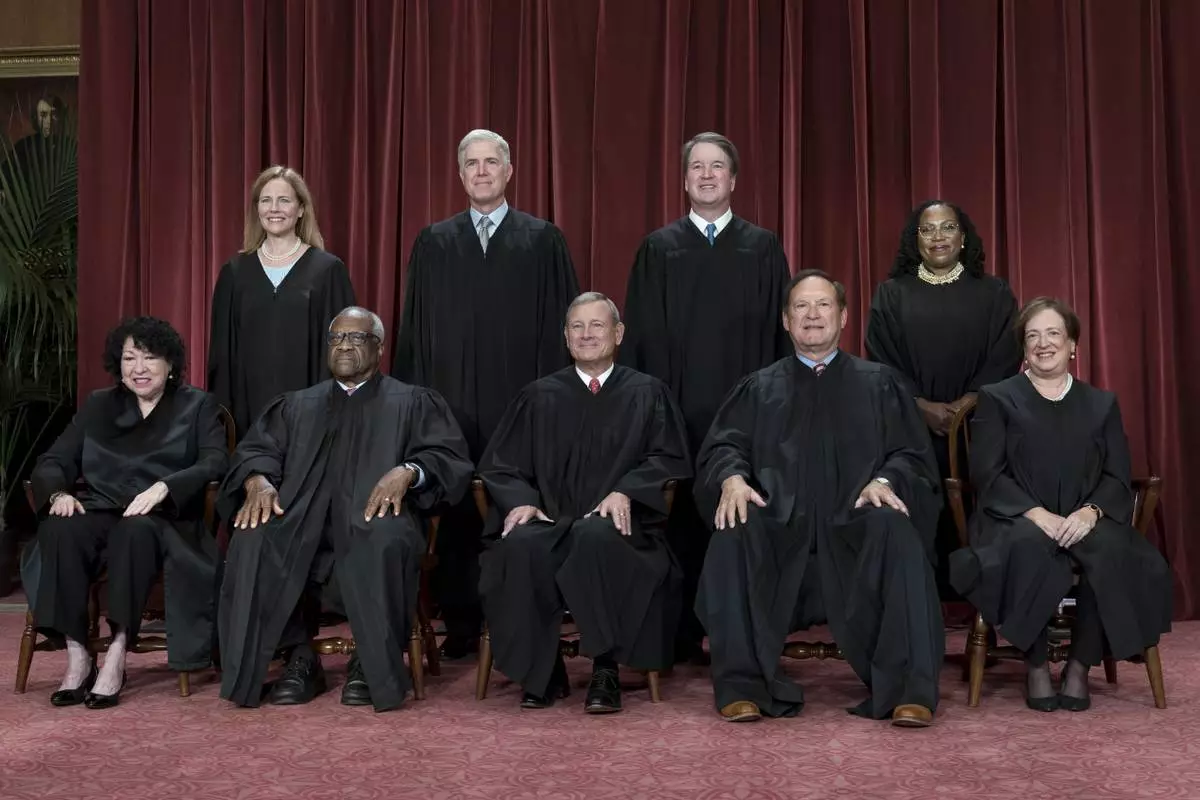
FILE - Members of the Supreme Court sit for a new group portrait following the addition of Associate Justice Ketanji Brown Jackson, at the Supreme Court building in Washington, on Oct. 7, 2022. Bottom row, from left, Associate Justice Sonia Sotomayor, Associate Justice Clarence Thomas, Chief Justice of the United States John Roberts, Associate Justice Samuel Alito, and Associate Justice Elena Kagan. Top row, from left, Associate Justice Amy Coney Barrett, Associate Justice Neil Gorsuch, Associate Justice Brett Kavanaugh, and Associate Justice Ketanji Brown Jackson. The core issue being debated before the Supreme Court on April 25, 2024, boils down to this: Whether a former president is immune from prosecution for actions taken while in office — and, if so, what is the extent of the immunity? (AP Photo/J. Scott Applewhite)
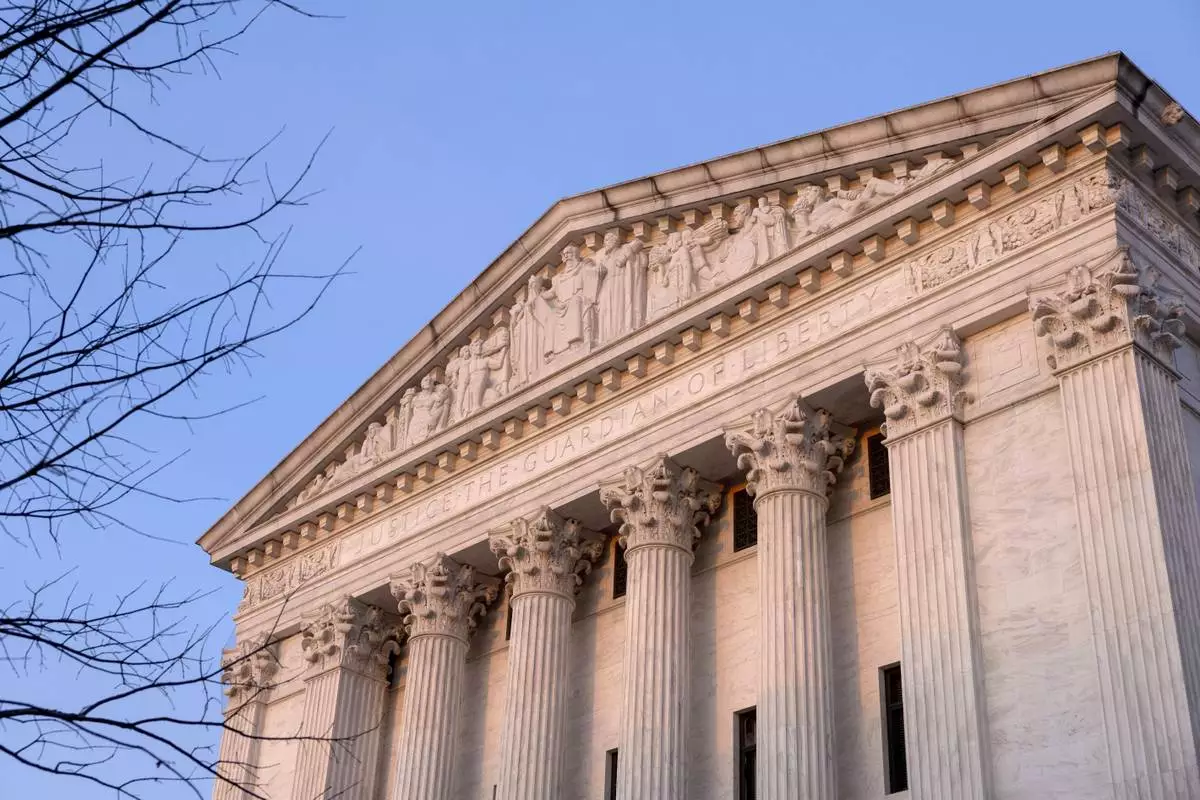
FILE - The Supreme Court of the United States is seen in Washington, March 26, 2024. The Supreme Court is hearing arguments this week with profound legal and political consequences: whether former President Donald Trump is immune from prosecution in a federal case charging him with plotting to overturn the results of the 2020 election. (AP Photo/Amanda Andrade-Rhoades, File)
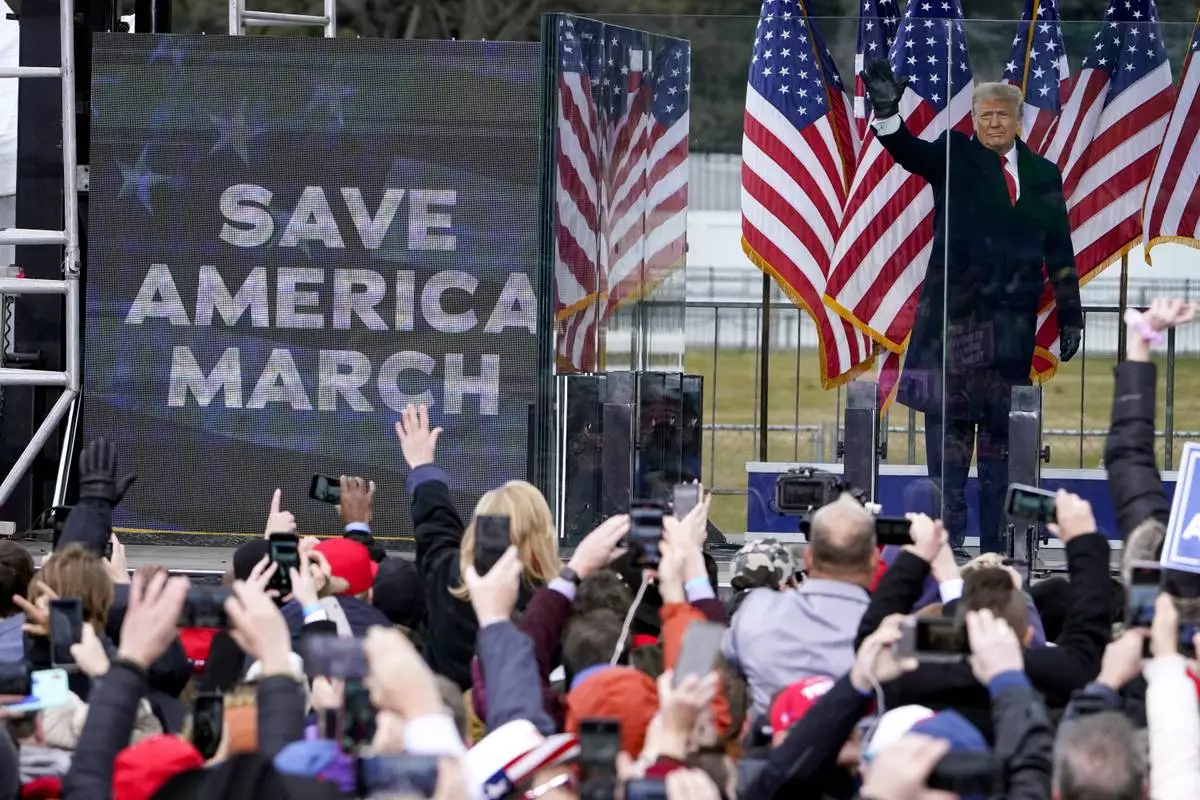
FILE - President Donald Trump arrives to speak at a rally in Washington, on Jan. 6, 2021. The Supreme Court will hear arguments over whether Trump is immune from prosecution in a case charging him with plotting to overturn the results of the 2020 presidential election. (AP Photo/Jacquelyn Martin, File)








